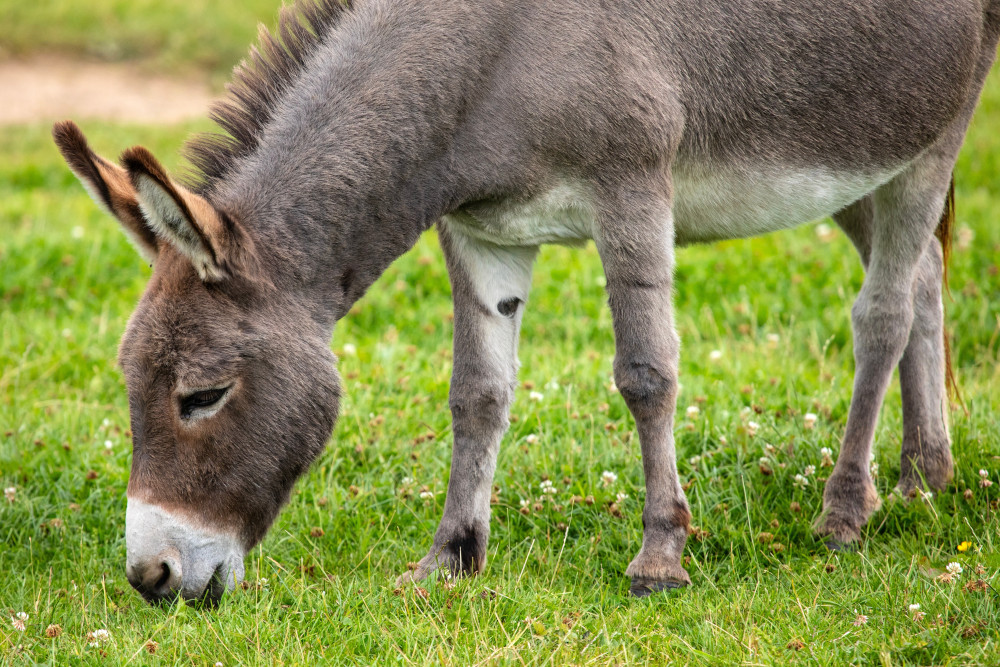What should I feed my donkey?

Donkeys have evolved over thousands of years to live in semi-arid environments where the nutritional quality of the food available is very poor. They have adapted to eat fibrous plant material in small quantities throughout the day. This is known as trickle feeding and helps to keep the donkey’s digestive system healthy and to keep the donkey occupied.
Please note that, while donkeys are a member of the Equidae or horse family, they are a different species to horses and therefore have different needs.
Basic rules of feeding a donkey
- Feed little and often as donkeys are ‘trickle feeders’.
- Any change in the feeding regime must always be carried out gradually over a couple of weeks.
- Always feed according to the donkey’s age, weight and temperament.
- Avoid dusty or mouldy feeds.
- Access to an equine salt or mineral lick is advisable (avoid mineral licks designed for other types of livestock as they may contain inappropriate mineral levels).
- Always have clean water available.
High fibre requirement
- Donkeys require a diet high in fibre and low in protein, sugars, starch/carbohydrates and calories.
- The donkey diet should consist of mainly good quality barley straw or oat straw (barley straw is best) and carefully restricted access to grass.
- Donkeys may require supplemental hay if they are not maintaining good body condition with the straw and restricted grass diet (for e.g. during the winter months). Types of suitable hay include: Meadow hay or seed hay (from Rye or Timothy grass).
- Please look out for ragwort in hay as this is highly poisonous for donkeys.
Important note: Some donkeys, even young donkeys may have difficulty eating straw, hay and grass due to poor dentition. These donkeys will require veterinary attention to address the dental issues and special dietary attention to ensure they receive adequate nutrition. They may require supplementary feeding with high fibre products that are more easily eaten e.g. short-chop high fibre products to reduce the need to chew. Mouth and teeth checks should be done by an equine vet or dental technician at least twice yearly. Signs of dental disease include drooling, dropping feed, slow or reluctant to feed and bad breath leading to weight loss.
Common health problems associated with an inappropriate diet
- Be aware of the risks of laminitis (inflammation of the sensitive tissues in the hoof causing pain and lameness) from excessive consumption of grass or cereal-based feeds (stressed grass i.e. frosty conditions also increase the risk of laminitis). Donkeys are particularly at risk of this condition when the grass is lush and growing quickly. Fields which have been previously fertilised may pose a greater threat. Laminitis is a serious condition that requires urgent veterinary advice.
- Limit cereal (grain) based diets. In one study, donkeys that had been fed a diet including cereal-based concentrates were more likely to have gastric ulcers when compared to donkeys fed on a fibre concentrate or forage-only diet.
- Donkeys may also become obese on unrestricted grazing. The sensible use of fencing will enable you to control your donkey’s grass intake. Please keep your fence well maintained and check it regularly, moving as appropriate. The rotation of grazed areas can also be very useful in helping to control parasitic worms.
- Feeding cereal-based concentrates is generally not recommended due to the risk of health problems (unless specifically recommended by a veterinarian).
General
- Donkeys kept indoors require a floor-level feed bin or corner-floor feeder placed so that feed cannot get soiled. Hay nets are not recommended as it is better for donkeys to eat from the floor and empty hay nets can be a hazard. Place enough straw in the feeder so that they can browse through it. There will be no waste as the remainder can be used for bedding. If possible, position the feeder so that the donkey’s feet are not on the bedding while they are eating, so they have a chance to dry out. It is recommended to allow ‘paddock’ time to exercise and for environmental enrichment.
- Donkeys should always have access to a clean water supply and they may be quite fussy about what they drink. A securely supported bucket or a self-filling trough should be constantly available and should be cleaned out daily after the stable has been mucked out to avoid a build up of dust or dirt in the water.
Elderly donkeys
- Please note that elderly donkeys may require special dietary attention. Dental disease and/or other health problems may mean that older donkeys have trouble chewing long strands of straw/hay and therefore they may require supplementary feeding to provide an alternative fibre source. Short-chop products (high in fibre and already chopped up) may assist in these cases.
Continually assess your donkey’s body condition and make changes to the diet accordingly. Please consult your vet should you have any questions or concerns.
Was this article helpful?
This work is licensed under a Creative Commons Attribution-NonCommercial-NoDerivatives 4.0 International License.


